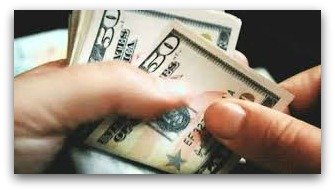Easy Financial Fitness
Easy financial fitness? Isn't this supposed to be hard?
There are countless rows and stacks of books on the subject. Newspaper, magazine and online articles. Professional financial people. Your parents, grandparents, teachers, priests, even Jesus and God telling you what to do with your money.
It is enough to drive you to spend your money foolishly rather than save and invest.
Let's bring things down a notch.
Most of us are not going to have hundreds of thousands of dollars to work with or sink into the stock market or real estate.
Most of us work full-time jobs and will keep working them into we see our way clear to retire. We want easy financial fitness.
Easy Financial Fitness Ideas from 2 of My Favorite Bloggers
Start out by absorbing these easy to understand lessons from Caleb Jones and Bob Wells.
Caleb is mid-40's, divorced, writes about business success and success with women. He is self-employed. His writings will help any man from teenagers to old age.
Bob is early 60's, divorced, retired early from a job he hated. He writes about van living and the extreme satisfaction he has found from that type of simple living. His writings will help anyone who longs for inexpensive adventure and a simple life.
I love them both.
Easy Financial Fitness From Caleb Jones - AKA Blackdragon
Here's How Poor Americans Really Are
I have inserted his best advice here -
1. Save $1000 cash somewhere if you don’t already have it.
2. Start paying down all of your debts, in order of loan balance, starting with the smallest one. (It makes more mathematical sense to pay them off in order of interest rate, but when dealing with emotional, irrational human beings, your odds of success are much higher if you pay down off starting with your smallest one and working your way upwards.) If you encounter any emergencies, use your $1000 emergency savings instead of going into more debt. If/when you use it, stop paying off your debts until you rebuild that $1000 again.
3. Once all your debts are paid (except your home mortgage if you have one) work to turn that $1000 emergency fund into a savings account that is equivalent to 6-12 months of living expenses. Do not use a bank for this account (ask Cyprus and Greece all about that). Use an investment firm or cash instead.
4. Once you’ve got 6-12 months of living expenses saved (I think 12 is better than 6, but that’s just an opinion), start investing for the long-term.
This Advice works well for most men from about 18 years old until forever
I like his simple advice. Have $1,000 cash hidden in your home first. Then start paying off those debts. Once the debts are paid off, save up 6 to 12 months living expenses. Then invest.
Most of us do this all backwards. We get into too much debt. We have no way to get our hands on $1,000 cash when we really need it. No, on payday does not count. Probably hardly anyone has 6 to 12 months living expenses saved. That is a lot of money for a typical person, even someone who is frugal. And most of us start investing, in the way of employer sponsored 401Ks, effectively keeping large amounts of our own money locked up away from us until we are old. Maybe too old to enjoy that money. Many of you will be dead.
That first $1,000 can be somewhat difficult to obtain. You are always tempted to pay your bills first, or try to pay off your debts quickly and spend any extra money you have.
Don't.
Keep that $1,000. Make it sacred. Keep it well hidden and protected. Take it out and enjoy the feel of it sometimes. Know that you have it. Know you are keeping this money just for your well being.
Then get busy on the rest of the steps. But be patient. Paying off large debts takes time. So will accumulating 6 to 12 months living expenses.
The good thing is that as you are paying off debts, your living expenses will be getting smaller. For example if you have debts that equal $1,000 per month, once you have paid those off, your living expenses decrease by $1,000. It will be easier to accumulate cash once you no longer have debts to deal with.
Easy Financial Fitness From Bob Wells at CheapRVLiving
Do We Have a Safety Net - What About When We Get Too Old for the Road, or Get Sick
His main financial recommendation in this article is to have $4,000 in cash for emergencies.
If you follow my standard advice to have $4000 in an emergency fund, you already have a plan B.
Lets take an example of a sudden medical emergency or injury, what will you do once you are released from the hospital, but can’t take care of yourself?
With $4000 you could rent a motel room for a few weeks while you find a $2000 used travel trailer and got it into an RV Park. That’s still going to be very cheap living, probably less than you would be paying in a house.
There are LOTS of really cheap RV parks in Arizona, you want to get one the closest to a major city.
$200 will buy you a portable air conditioner you roll around and the trailer stays home while you drive the van, you have all hook-ups in the park.
Once the crisis is over, you can sell the travel trailer for
close to what you paid for it and be on your way. What if it’s going to
be a permanent change in your life? You stay in the RV Park and adapt to
your new reality.
Bobs Advice is Geared toward people living simply on the road in vehicles
I love Bob Wells. His website, writings, videos and pictures are inspiring.
But I am just a little too young to take advantage of the simple lifestyle he describes. His way seems to be perfect for single men, who like being alone, crave adventure, travel and new experiences and who are past the point of taking care of others.
I am single and like being alone, crave travel, adventure and new experiences. But I am not past taking care of my children.
I was able to get past taking care of my ex-wife...thank goodness. Wives and ex-wives, and even live-in girlfriends are enormously expensive. You had better love her and she had better be delightful. Because you will not have much time, energy and money for adventure and new experiences.
But I love the idea of $4,000 cash being enough to see you through hard times.
It seems like $4,000 is not so much money that an average person could save that much and leave it alone.
It is a reasonable amount that with some dedication, persistence and discipline, you could set that much aside and leave it for true emergencies.
Quick Video Summary of Easier Financial Fitness
Summary of Easy Financial Fitness
Obviously, you need to be earning money on a consistent basis. How much depends on your needs and how many stupid situations (bad marriage, huge debts, massive mortgage, excessive children, etc.) you got yourself into.
You need that consistent cash flow toward you in the form of your job, or business, or passive income, or pension.
 Keep actual dollars in addition to your credit cards and debit cards. Plenty of cash is easy financial fitness
Keep actual dollars in addition to your credit cards and debit cards. Plenty of cash is easy financial fitness- Eliminate debt. Yes, this is difficult, but critical.
- Work on accumulating 6 to 12 months living expenses. Get to that first $4,000 as Bob suggests.
- Only invest after you have done the first 3 items. Don't lose your money investing.
This is easy financial fitness...or not. Most of us are not going to accumulate that much money. Better to at least keep your cash on you or in a bank. As you get older, you can start to live cheaper.
But cheaper does not mean living worse. It can mean living better.
The only way I could become the happier man I am today was by leaving my wife. You might be in the same situation I was in. I suggest you take a look at my book - Leave Your Wife & Become a Happier Man with the 3 Step System.
Share a Comment About This Topic.
Do you have a comment about this or something to add? Share it!
